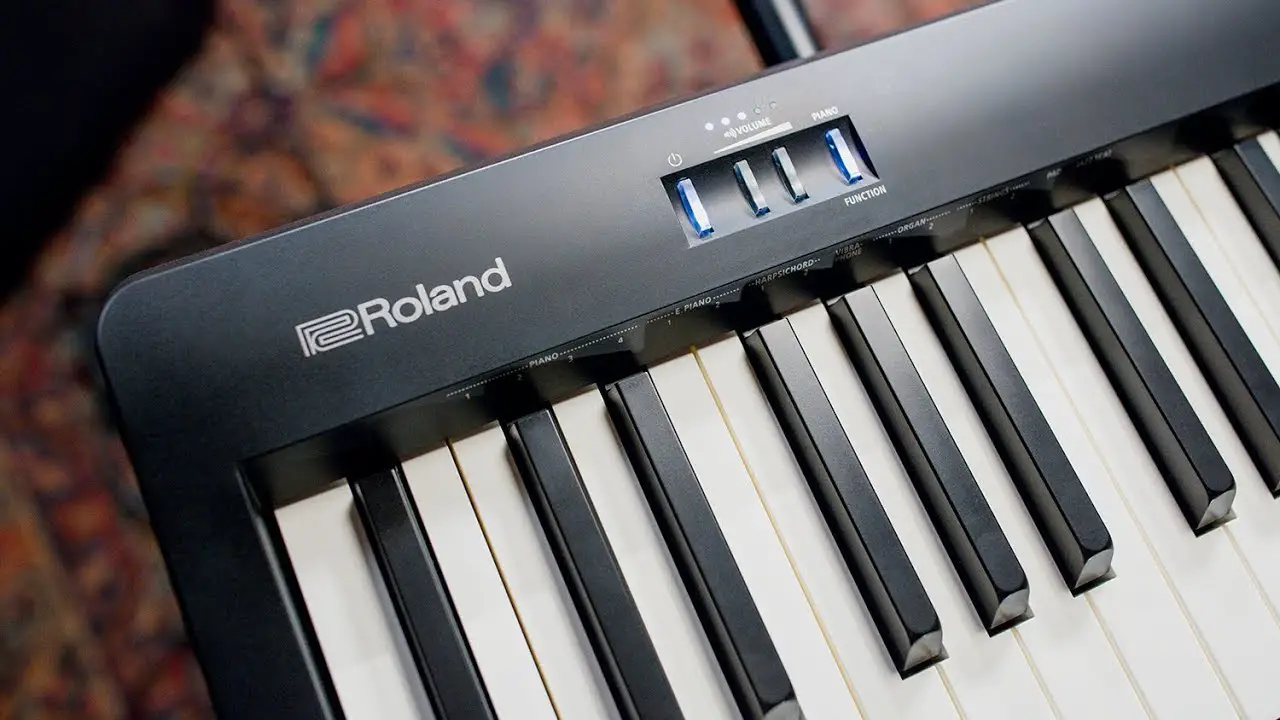
You may have wondered, “Is it possible to learn the piano without a piano?”
Some people assume you need to own one if you want to learn.
However, that’s not necessarily the case.
Even if you don’t have a piano, you can still learn to play it.
How is this possible?
Keep reading, and I’ll show you how to learn the piano without a piano!
Quick NavigationAlternatives to Traditional Piano LearningDigital PianoWhat to Look For in Digital PianosThe Keyboard AlternativeKey RangeCostSoundsLCD DisplayShould You Get a Digital Piano or Keyboard?Most Affordable Keyboards and Digital PianosWhy Learn The Piano?Ear TrainingLife SkillIncreases Reading AbilityPractice Piano WITHOUT A PianoConclusion
Alternatives to Traditional Piano Learning

Digital Piano
Since acoustic pianos are usually expensive and heavy, many people choose digital pianos instead. Digital pianos come in all shapes, sizes, and brands. Let’s say you learn a song on a digital piano. Will you be able to play it on a real piano instantly? The answer is yes, your skills on a digital piano apply to a real one.
However, several factors can slightly alter the transferability. For example, some of the cheaper digital pianos have a light action, even if they claim to be fully-weighted. The companies known for producing the best action are Yamaha, Casio, Nord, Roland, and Korg. Here are the factors that play a role in the digital piano to piano transferability:
- Graded action
- Size
- Volume
If you want to learn the piano without a piano, it’s essential to get a keyboard with graded action. This type of action doesn’t inflate the price, but not all digital pianos have it. So, what is it? Graded action is a realistic imitation of an acoustic piano’s imbalanced action. The lower keys on grand and upright pianos are slightly heavier than the higher ones. Many of the high-quality digital pianos include a graded action. This technology has gotten so good that many experienced pianists can’t even tell the difference.
The digital piano’s size is also important. Most of them have 88 keys, but some of them don’t. This is where it gets confusing to differentiate between a digital piano and a keyboard. In general, digital pianos lean towards having 88 fully-weighted keys. On the other hand, keyboards tend to have unweighted keys and fewer of them. There are more differences, but I’ll get into them later. If you want to learn classical music, it’s important to have an 88-key fully-weighted digital piano.
A smaller thing that most people don’t consider is volume. If you invest in a digital piano with weak external speakers, your ears will get used to a quiet sound. The minute you play a real piano, the sound will overwhelm you, or at the very least, slightly distract you from your music. The best way to counter this factor is to use headphones with a digital piano. Regardless of the brand, headphones will provide the best playing experience. Even though this factor can slightly affect the transferability, it’s easy to go around.
What to Look For in Digital Pianos
Since there are countless brands to choose from, it’s beneficial to write down some characteristics you value in digital pianos. Here are some more important things to look for in them:
- Sound
- Portability
- Cost
- Functions
Sound quality is a big factor when choosing a digital piano. If you do some digging, you’ll be able to find the sound engine in every model. For example, Yamaha samples their digital piano sounds from their CFX 9’ concert grand piano. In digital pianos, the number of sounds doesn’t mean a higher sound quality. In fact, more sounds usually means a lower overall quality.
You should also pay attention to size and portability. Digital pianos can be anywhere from 20 to 100 pounds. If you want something you’ll be able to move around easily, you’re better off with a lighter product. The heavier digital pianos tend to be workstations, which have huge soundbanks, extensive recording capabilities, and countless other settings. In general, the heavier the keyboard, the more expensive it is.
Buying a digital piano in your budget is important. You probably don’t want to spend your life savings on one. That may even be the reason you’re looking for a piano alternative in the first place. Good digital pianos usually range from $300 to $1000. Even if you can find one for cheaper, you’re better off getting one you can trust.
You’ll likely enjoy a digital piano with a nice set of functions. Some of these include a metronome, recorder, LED display navigation, transposer, and a quarter-inch output.
A metronome is essential for your growth as a musician. It helps build your internal rhythm so you can play in-time by yourself. Recorders are highly convenient because they allow you to listen to yourself, which is essential for a growing musician. Though LED navigation and transposing features are just nice additions, the quarter-inch output is a must. Digital pianos with this output can hook up to external speakers, a mixer, and an audio interface. All of those things are huge pluses for musicians. In general, look for a digital piano with a wide variety of connectivity options.
The Keyboard Alternative
In addition to digital pianos, you can learn to play the piano on a keyboard. This option is slightly less preferred, but it can still work. Keyboards are very different than digital pianos in terms of purpose and characteristics. The same companies that make digital pianos also make keyboards, though.
As I mentioned earlier, keyboards tend to have unweighted keys, which is a slight downside for learning the traditional piano. However, the transition to a heavier key weight isn’t always as challenging as it seems. I’ve seen many pianists start with a keyboard before moving to a real piano. Within a week of that transition, most people transfer their skills to the piano with no problem. Let’s take a look at some keyboard characteristics.
Key Range
It’s widely known that keyboards have a wide variety of key quantities. Some of them have as little as 32 keys, and others have the full 88. Each key number indicates a slightly different functionality. For example, a 32-keyed keyboard will likely be used as a MIDI controller. Keyboards with over 60 keys can be used to learn the piano.
Cost
Keyboards can be significantly cheaper than digital pianos. While the lowest digital piano price is $300, you can find small keyboards for $100. However, keyboards this cheap aren’t the best for learning the piano. They have a limited number of keys, and they aren’t fully-weighted. Is it possible to learn the piano on them? Yes, it’s still possible, but the transition to the piano might be a little rockier than if you use a digital keyboard.
Sounds
Another distinct aspect of keyboards is the large number of sounds they have. Unlike digital pianos, they generally have several hundred tones to choose from. Though it’s entertaining to experiment with all of the sounds, it won’t help you learn the piano.
In terms of sound, digital pianos are quality, while keyboards are quantity. These sounds range from pianos, organs, strings, choirs, drums, and more. Keyboards can be helpful if you want to write and record music. If you download a recording software (DAW), you can compose music with the keyboards soundbank. So, if you want an extremely affordable option to learn the piano, you might choose a keyboard. However, you might not be able to transfer your skills as well.
LCD Display
Keyboards tend to have more comprehensive LCD displays. They’re usually larger and can be a touchscreen. This enhanced feature is due to a large number of functions and settings keyboards have. It would be significantly harder to access all of a keyboard’s features on a digital piano’s LCD.
Should You Get a Digital Piano or Keyboard?

Since you can learn the piano with both of these things, which one should you get?
Though it can be hard to decide at first, your ideal machine becomes clearer when you consider the aspects you value. If you value having lots of sounds over sound quality, your ideal choice is probably a keyboard. But, if you want the most authentic piano playing experience, your best choice is a digital piano. You’ll have to spend a bit more on a digital piano, but it’ll be worth it if you’re serious about improving.
Even though digital pianos are pricier than keyboards, they’re still significantly cheaper than real pianos.
Another reason you might buy a keyboard is if you want to compose more than just piano music. You can record on digital pianos, but it’s more focused on the piano itself. Most artists use keyboards to help them compose music.
Most Affordable Keyboards and Digital Pianos
As I mentioned earlier, some of the best brands are Yamaha, Casio, Nord, Korg, and Roland. Out of those, Yamaha and Casio have the most affordable products. If you’re unsure whether you’re going to pursue piano playing or not, it might be best to get one of these brands. But, if you have a little more money to spend, you could go to one of the other brands. Nord is known for its world-class keyboards. Along with being highly-powerful machines, they’re also very expensive, costing over $3,000.
Why Learn The Piano?
Think about the reason you’re interested in playing. Maybe you’ve heard inspirational performances, have a love for piano music, or just want a cool skill. Regardless of the reason, it’s probably only the tip of the iceberg of benefits that come with playing the piano.
Ear Training
If you learn the piano, you develop better ears over time. You’re more aware of music on the radio and in everyday life. You might even get to a point where you can hear a song and play it almost instantly. It sounds challenging, but it’s not that uncommon. Pianists of several years often have the ability to learn songs very quickly. It’s a beautiful skill to have, as it’s enjoyable and impressive to others.
Life Skill
You can play the piano your whole life. Since it’s not something you have to stop doing, you can always build your skills. For example, it’s excellent to be athletic and play sports, but you might not be able to do them at an old age. You can entertain yourself and others for the rest of your life.
Increases Reading Ability
Being fluent with sheet music can increase your reading ability. Both activities involve reading from left to right, so they aren’t very different. Many parents encourage their kids to learn the piano because of this advantage.
Practice Piano WITHOUT A Piano
Conclusion
Since it’s possible to learn the piano without a piano, you’re in luck. You don’t necessarily need to get a bulky, expensive piano to learn. A digital piano or keyboard can do the trick for most people. If you’ve wanted to learn the piano for a long time, now is the time to start. You have your whole life ahead of you, so get to playing!
